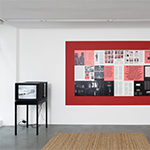A Convening of Civic Poets is part of a multi-faceted collaboration between KADIST and Sharjah Art Foundation. Co-curated between both directors and includes a good selection of works from their respective collections, coupled with other invited works and practitioners. The exhibition in Paris will be followed by a chapter in Sharjah in the Spring of 2024.
A Convening of Civic Poets is a project gathering films, playlists and conversations, drawings and other artworks which collectively enquire into the figure and practice of the civic poet, and its potential to redefine the scope of civic engagement.
Civic poetry is generally understood as a politically engaged form of poetical production, in which the poet is not detached from the social struggles of his. her context and time, but rather acts as an accomplice and activist for them through their practice.
Pier Paolo Pasolini, one of its greater exponents, defended a vision of civic poetry based on the belief that poetry is not about individual fulfillment but that it is essential for the civic enterprise of social transformation.
Civic poets dig deeper into the present and historical urgencies we are part of, and contravene any given expectations. Their writings, utterances, and gestures intercede in favor of a non-indulgent but ample, radical and embodied notion of social justice.
Many of the artists present in this exhibition pay homage to such figures. Continuing his series of portraits of key intellectuals of our times, Manthia Diawara’s feature film Angela Davis: A World of Greater Freedom follows and dialogues with the philosopher and activist on her notion and experience of freedom as situated in the long strand of her anti-prison, anti-racist, black feminist activism.
The exploration of Jean Genet’s radical allyship is at the center of Bouchra Khalili’s film Twenty-Two Hours and installation The Typographer & The Radically Ally. Hajra Waheed’s research materials acknowledge the work of poets, singers, and activists whose songs are blended into the sound compositions of Hum, a project ultimately exploring the lexicons that emerge from within collective struggles in order to amplify transnational solidarities. Among the sources is Nûdem Durak, a Kurdish singer imprisoned for singing in her native language. On her side, Jinoos Taghizadeh stamps on the reverse of common stamps the portraits of four Iranian intellectuals murdered in 1989 because of their opposition to the government. Similarly, multiple voices of black female civil rights protesters are channeled in the work of Helina Metaferia, celebrating the legacy of inherited stories of protest in today’s social movements.
Radios, and the long tradition they have served in the dissemination of transformative ideas and sounds, are also present in the exhibition. The playlist by the Learning Palestine Group for Radio Alhara composes a transhistorical assemblage of sounds and addresses from poets, intellectuals, and musicians concerning Palestine.
Hajer Ben Boubaker’s podcast episodes Barbès Blues trace the story of Mokhtar, an unavoidable reference in the North African migrant and workers movements in Paris, to chart a constellation of the interconnected political and cultural struggles departing from the neighborhood of Barbès.
Other artists in this show define themselves as poets, and make use of the specific matter of language and utterance in the works presented here. This is the case of the iconic Palabrarma series by poet and artist Cecilia Vicuña, born out of the drive to harness the political force of language in the wake of repressive dictatorships. Another one is David Wojnarowicz, as portrayed in the films done in collaboration with photographer Marion Scemama, in which the artist and activist uses spoken word to vehemently denounce in the context of the AIDS crisis the programmed death enforced through the stigmatization of sexuality.
The constellation of gestures, voices, and issues raised by the works and their echoes shape the blurry contours of a geography of struggle and solidarities, from Palestine to Barbés. A central question thus lingers at the heart of it, registered in the drawings of Nidhal Chamekh, on how artists assume the role of witness and accomplice.
Additionally, a program of public events of workshops and conversations with Joe Namy and Farah Al Qasimi will further expand on the questions and practices at stake.
Renouncing to any form of exhaustivity or conclusion, but rather tending towards the propositional, this project seeks to probe the timeliness of civic poetry today to expand a sphere of radical civility, propelling new poetics and tactics of engagement.
Press release from Kadist
Image: Bouchra Khalili. Left to right: The Typographer. 2019; The Radical Ally. 2019. Installation view of A Convening of Civic Poets at Kadist, Paris, 2023. Photography © Aurélien Mole. Image courtesy of Kadist



